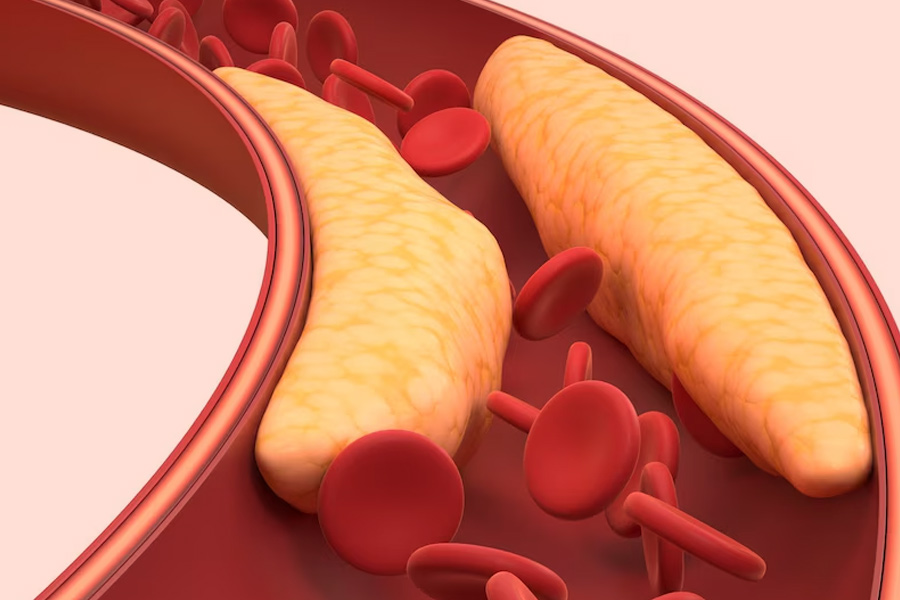
While the never ending debate on whether egg white is healthier or yolk continues, both can have their pros and cons. In this article, let us talk about whether consuming egg yolk can increase your cholesterol levels?
Table of Content:-
Egg yolk has enormous health benefits as it contains a high amount of vitamins A, D, E, K, B1, B2, B5, B6, B9, and B12. Egg yolks are a source of protein and are packed with nutrients, including iron, calcium, zinc and so on.
Studies have shown that eating two eggs per day can cover 10% to 30% of vitamin requirements in humans due to its high vitamin content in egg yolk. Despite having several health benefits, yolks can contribute to an increase in cholesterol levels.
A study published in 1961, egg yolk containing 240 mg of cholesterol, had a greater hyperlipidemic effect than pure crystalline cholesterol dissolved in oil. The study also found a 12% increase in LDL cholesterol levels because of consuming egg yolk.
The relationship between egg yolks and cholesterol levels is a topic that has been debated and studied extensively. To get a clarity around the topic, OnlyMyHealth interacted with Abhilasha V, Chief clinical Nutritionist, Cloudnine Group of Hospitals, Bengaluru.

Cholesterol in Egg Yolks
“Egg yolks are indeed high in cholesterol. A single large egg yolk contains about 186 milligrams of cholesterol, which is more than half of the daily recommended intake for cholesterol for most people,” Abhilasha said.
Also read: Eggs: Whites, Yolk Or Whole, Here's The Healthiest Way For You To Consume Them
Dietary Cholesterol and Blood Cholesterol
“For many years, it was believed that consuming foods high in cholesterol, such as egg yolks, would significantly increase blood cholesterol levels and subsequently raise the risk of heart disease,” Abhilash said. However, recent research has nuanced this understanding:
1. Dietary Cholesterol vs. Blood Cholesterol
- For most people, dietary cholesterol has a smaller effect on blood cholesterol levels compared to the effect of trans fats and saturated fats, as per Abhilasha.
- The liver produces less cholesterol when more is consumed from the diet, balancing the levels in the blood to some extent.

2. Individual Variation
- Explaining how yolk impacts cholesterol levels in some people, Abhilasha said, “Some individuals, referred to as "hyper-responders," do experience a significant increase in blood cholesterol levels when they consume dietary cholesterol.”
- However, for the majority of people, moderate egg consumption does not substantially impact blood cholesterol levels.
3. HDL and LDL Cholesterol
- Eggs can raise levels of high-density lipoprotein (HDL, the "good" cholesterol).
- They may also slightly increase low-density lipoprotein (LDL, the "bad" cholesterol) in some people, but the type of LDL particles (larger, less dense particles) that increase are considered less harmful compared to smaller, dense LDL particles.
Also read: What Is Borderline Cholesterol And How To Prevent It From Becoming 'High’?
Safe Egg Consumption

Recent studies suggest that moderate egg consumption (up to one egg per day) is generally safe for most people and does not increase the risk of cardiovascular disease. Some key points from research include:
Moderate Consumption: Eating up to one egg per day is not associated with increased heart disease risk in the general population, as per Abhilasha.
Nutrient Benefits: Eggs are a good source of high-quality protein, vitamins, and minerals, including B vitamins, vitamin D, and choline.
Balanced Diet: Abhilasha advised, “The effects of egg consumption on cholesterol levels and heart health should be considered within the context of an overall diet,” adding, “A diet high in fruits, vegetables, whole grains, and healthy fats can mitigate potential negative impacts of dietary cholesterol.”
Conclusion
While egg yolks are high in cholesterol, their impact on blood cholesterol levels varies among individuals. For most people, moderate consumption of eggs does not pose a significant risk to heart health and can be part of a nutritious diet. As with any dietary component, it's important to consider overall dietary patterns and lifestyle factors.
Also watch this video
How we keep this article up to date:
We work with experts and keep a close eye on the latest in health and wellness. Whenever there is a new research or helpful information, we update our articles with accurate and useful advice.
Current Version